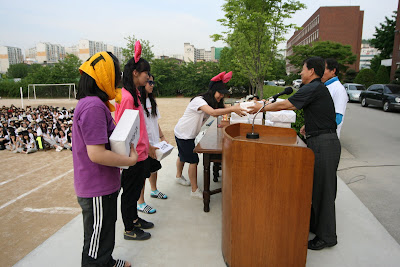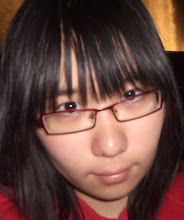.....................The Sports Day체육대회 usually takes place on May. (Typically the midterm ends on the first week of May, and it's a good way to blow off their stresses!) Students do practice a lot for all the games and sports for the day----there's sure a "competition." Third graders often take the most responsibility on arranging things for the Sports Day, possibly hassling with juniors, but they're overcoming this "seniors decide everything" tradition and trying to participating equally for the event.
Along with practicing, they make an order for their team shirts. Good way to make them stuck together.

Sometimes it's great chance to show off their characters. After all they couldn't in schooldays when they wear uniforms.

Here are some common games they do.
Rhythm Dance, the highlight of the day. In my school the first graders do. A whole class participate for harmonious work. Typical collectivisic work.
..........................................T-ball, an easier form of baseball. Girls definately aren't able to hit the ball that's thrown to them, so instead they put the ball in front of them to hit. Other rules are same as baseball.

.Jump-rope, both for individual and group. As far as I know the group one gains more points.
Race for various distances. There's also a relay with a baton, most exciting of the all.
..................................Ssireum, korean wrestling. Girls hesitate to go for it, but the game itself is lots of fun.
Hula hoop, with all kinds of difficult requests. Like three steps forward with hoop, with your one leg, ect.
Guys who don't do the sports root for the team, it also counts a lot on their total score.
At the end of the game, the team that got the most points take the first place and the class is given an award.







